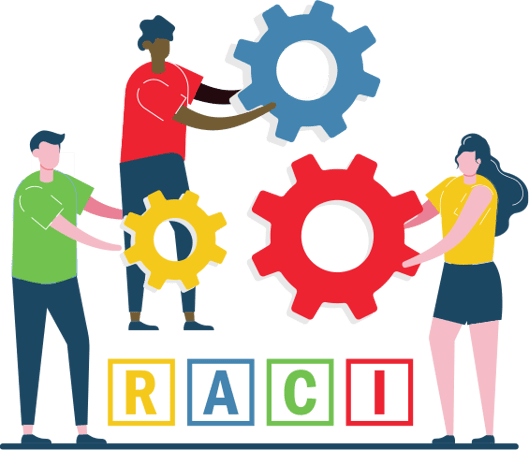By Cassie Solomon, RACI Solutions
RACI is the best-known of the decision rights tools, invented in the mid-1950’s. Since then, the Project Management Institute has codified it as part of the PMI exam, so we know that about 5 million people globally know (and might be using) the tool. 
But people often get confused about the classic definition of the “A” code. The PMI version calls this “Accountable” and their definition is “the person who will sign off on the work and judging its completion and how it meets quality standards”. People mix up this kind of accountability with the R code which stands for “Responsible”. If I am responsible for an activity or a role, am I not making sure it meets quality standards? Don’t I judge when a job is complete?”
As a global tool, RACI 2.0 is most helpful when it clears up role confusion (defined as being uncertain about oneself and one’s place in various social settings. We apply it to being uncertain about your role at work) and we believe the classic definition of the “A” role isn’t simple enough. At RACI Solutions, we have redefined the “A” code, along with a number of our global clients, to stand for something more basic. We define the “A” as Approver. This is the person who makes the decisions or vetoes a recommendation. Yes, in that capacity they are judging the quality of the work. We say, “If you can stop a project from moving forward for any reason, you are acting as the “A”.
In work projects, many different decisions need to be taken. When we talk about empowering the workforce, what we are really saying is that we want to distribute authority – we want people to be able to make decisions on their own. So it is very helpful to narrow the definition of this code to simply be about making decisions. This makes an invisible aspect of our life at work more visible. Once something is visible, you can discuss it, reshape it, and use it to create change.
By the way, Bain’s decision rights tool, RAPID[1], solves this problem, and the “D” stands for Decide, the person who makes the decision.
It's a simple re-definition, but a powerful one.
The Project Management Institute is also very clear that there can only be one “A” for an entire project. We think this refers to the sponsorship role, the (usually) executive level that has oversight and yes, accountability, for the whole initiative. But we all agree that this executive should not be making every decision! And that’s where our Approver role comes in very handy.
My mentor, Thomas North Gilmore, taught me that EVERY ROLE should have accountability. The decision-makers are accountable for the quality of their decisions, and those who are Responsible for doing the work are accountable for its quality. People who are contributing their expertise (the C’s) are accountable for the quality of their advice. Even those who are only Informed (the I role) are accountable for taking in the information. (That’s about effective communications planning, and that’s the subject for another day.)
By redefining the RACI “A”, we liberate this word “accountability” and its power and allow all of the roles to share it. Especially as we work with our clients to strengthen accountability and empowerment in their organizations, we need to be able to make decision-making clear and visible.
[1] https://www.bain.com/insights/rapid-decision-making/#:~:text=What%20is%20RAPID%20decision%20making,lead%20to%20improved%20decision%20effectiveness.



